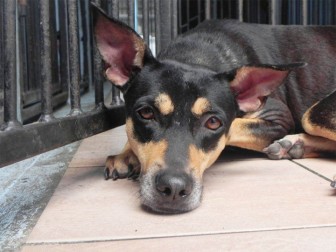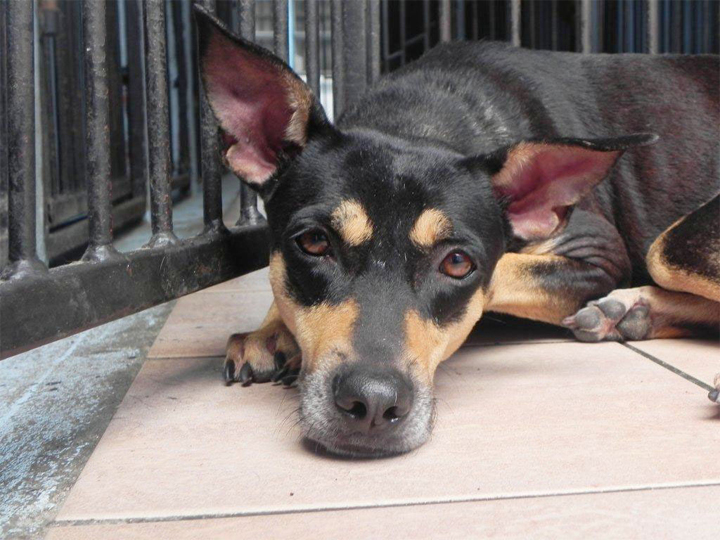Symptoms
A characteristic sign is the tendency for pain and lameness to shift from one location to another over a course of several weeks or months. The disease often is accompanied by fever, muscle wasting and lethargy. Pressure over the shaft of the affected bone elicits pain. X-rays show the characteristic picture of increased density in a long bone. If one carries out a lab test on the blood, an increased number of Eosinophils (a special type of white blood cell) will be found.
Treatment
As the cause is unknown, treatment is directed at the relief of bone pain. Most dogs recover spontaneously, but if severely affected, may never regain full muscle strength and condition.
Arthritis
(Degenerative Joint Disease)
Arthritis is a condition which can affect one or more joints in the dog. In some cases, it can be accounted for by a history of wear and tear to the joint. In others, it seems to occur with advancing age. Although it can begin in the first half of life, usually signs don’t appear until later.
Large breeds are affected more often than small ones. Heavy dogs, regardless of breed, are more likely to experience symptoms because of the excess stress placed upon their joints.
Rheumatoid arthritis is part of a generalized disease of body connective tissue. This is a rare cause of arthritis in the dog.
Septic arthritis is caused by an infectious agent which gains access to the joint. (This, too, is rare).
 The most common degenerative joint disease is called Osteoarthritis.
The most common degenerative joint disease is called Osteoarthritis.
This ailment occurs as a result of trauma, joint malfunctions or as part of the aging process. Although it occurs most often in the elderly, animals of any age can be affected. The cartilage in the joint is the tissue first to be affected. This normally smooth and elastic tissue (cartilage) becomes rough and is worn away, exposing the underlying bone. The ligaments and joint capsules become stretched, and muscles in the region of the joint are weakened. Opposing bones move against one another unnaturally, causing inflammation, deformation, and further injury. Osteoarthritis can affect a single joint or many joints. The large weight-bearing joints of the hip, stifle, shoulder, and elbow are most frequently affected; lumbar vertebral joints (those in the back-bone) and the joints of the jaw can also be affected. Although several joints may be diseased simultaneously, pain and disability may be clinically evident in only one joint.
Symptoms
Dogs with arthritis experience varying degrees of lameness, stiffness which is worse in the morning (or after getting up from a nap) and pain in the joints.
An acute flare-up leads to accentuation of the above symptoms and the development of a swollen joint which is tender to the touch. A “grating” sensation may be detected when working the joint back and forth.
X-rays show varying degrees of joint narrowing, destruction and remodelling of articular surfaces, and compensatory new bone formation in and around the joint.
Treatment
In those cases with a known cause, the treatment is directed at the primary disease. In others, it is directed at relieving joint pain and encouraging moderate activity to prevent joint stiffness.
Aspirin should be given for its analgesic and anti-inflammatory effects. The dose is five grains per 25 pounds weight. This dose should be given four times daily.
Steroids and Butazolidin may be required in certain cases. They should be given only for short periods, and then only under professional supervision.
Please implement disease preventative measures (vaccinations, routine dewormings, monthly anti-heartworm medication, etc) and adopt-a-pet from the GSPCA’s Animal Clinic and Shelter at Robb Street and Orange Walk, if you have the wherewithal to care well for the animals. Do not stray your unwanted pets, take them to the GSPCA’s Clinic and Shelter instead. If you do not wish your pet to have puppies or kittens, you may exploit the GSPCA’s free spay and neutering programme. If you see anyone being cruel to an animal, or if you need any technical information, please get in touch with the Clinic and Shelter by calling 226-4237.









